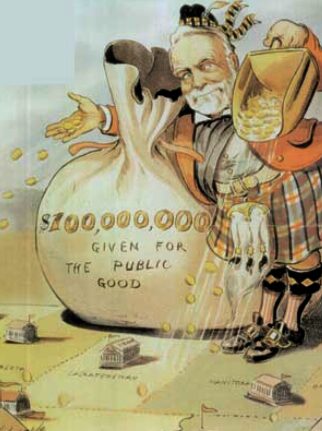This week on The Intelligent Edge, HBG senior researcher Rachel Dakarian provides a window into the ongoing discussion that members of the HBG Book Club have had recently over our first shared book. I think in the beginning we thought that we’d all read this useful book, share our thoughts weekly, and then go back to our work. What’s actually happened has been a lively, ongoing, daily chat-room discussion as we toss articles to each other with comments of “hey, read this! It’s *just* what we were talking about yesterday!” punctuating our times between book club meetings. Rachel expands on our latest discussion beautifully in this week’s article. We’re interested to hear your thoughts as well! ~Helen
As you may have noticed, ours is the era of the mega-gift. This trend of non-stop blockbuster giving has left many reeling or salivating – not to say that the two are mutually exclusive, nor will this trend be ending any time soon. Wealth and philanthropy are often perceived to fit hand in glove, but we prospect researchers know firsthand how difficult it can be to verify wealth and encourage charitable giving.
Non-profit organizations announcing a campaign gift, pledge, or bequest as their “all-time largest donation” (my current favorite example: an anonymous $40 million gift to Gustavus Adolphus College) may have begun to feel very commonplace. What does it mean when these announcements no longer feel special? Or positive?
I previously wrote about John Paulson’s gift of $400 million to Harvard in 2015, which caused some to foam at the mouth with disdain. In my article I said:
Donors can and should be able to support any nonprofit cause they choose. It’s our job as fundraisers to cheer them – and our fellow fundraisers who are successful at cultivating those donors – onward.
I stand by this statement. My intent is not to defend the activities of ultra-high net worth (#UHNW) individuals, they certainly don’t need my help (should you feel otherwise, Mr. Buffett, please shoot me an email), but I will defend charitable giving and the importance of donor intent.
A recent blog post on Quartz titled “The ethical argument against philanthropy” cites the opinion of Rob Reich, director of the Center for Ethics in Society at Stanford University (not to be confused with Robert B. Reich, the former labor secretary under President Bill Clinton):
Until there are widespread political solutions to social ills, we should stop praising hugely wealthy philanthropists … Philanthropy, if you define it as the deployment of private wealth for some public influence, is an exercise of power. In a democratic society, power deserves scrutiny.
This prompted a flurry of commentary from my fellow HBG Book Club members. As mentioned previously on this blog, we’re currently reading David Callahan’s latest book, The Givers: Wealth, Power, and Philanthropy in a New Gilded Age. The chatter around the office “watercooler” (located online for our #WFH team) focused on our professional and political perceptions of democracy and philanthropy. The relationship between capitalism and charitable giving is an unwieldy, important subject. Many of us echoed the opinion of Olivia Goldhill, author of the Quartz article:
But until the day that government services alleviate all human need, perhaps we should be willing to overlook the power dynamics of philanthropy—after all, surely charity in unchecked form is better than nothing?
We book club members share Goldhill’s perspective that the perfect should not be the enemy of the good in philanthropy. But if you felt a little twist in your gut while reading that excerpt, you are not alone. Unchecked activity of any kind is cause for concern, but the sentiment can be especially heightened when tax dollars are concerned. I’m reminded of a pithy quote from John Cassidy writing about “philanthrocapitalism” in The New Yorker:
But contrary to the old saying, this is one gift horse we should look closely in the mouth.
Refining my defense of Paulson in 2015, I wonder if the press – and perhaps the public at-large – could be experiencing mega-gift fatigue? Similar to donor fatigue, I define this feeling as a shrinking interest in responding generously to charitable gifts supported by extreme wealth although large donations were cheered in the past. I am deeply concerned by attempts to frame philanthropy as a tool used by UHNW individuals knowingly to undermine democracy.
In fact, Callahan himself says:
The new mega-givers are not the villains in this story…[Jim] Simons and other high-minded donors like him are coming along at a very fortuitous moment, and we should indeed be thankful as more of them step forward. Most are just trying to do the right thing. But as their power grows, so, too, must the scrutiny grow of how that power is used, along with the larger changes in U.S. society that are acting to amplify that power.
As an editor and contributing author to the book Philanthropy in Democratic Societies: History, Institutions, Values, Reich opined On the Role of Foundations in Democracies:
It is no exaggeration to say that we live today in the second golden age of American philanthropy. Growth in inequality might be a foe to civic comity, but it is a friend to private philanthropy.
Callahan acknowledges the import of donor intent while still advocating for reform:
Rethinking philanthropic freedom is a Pandora’s box that almost nobody want to open.
As we members of the HBG Book Club debate the points in Callahan’s book and in the many collateral articles we have been tossing back and forth for discussion in our chat room, we’ve come to agree that maybe it’s time to open that Pandora’s box.
For further reading
- Article: “Mega-gifts Are Rising and Alumni Giving Is Shrinking. Which Means What, Exactly?“ by Mike Scutari. Inside Philanthropy. 4/11/2017. https://www.insidephilanthropy.com/home/2017/4/10/mega-gifts-universities-fundraising
- Article: “Hey, Billionaire Donors: It’s Time to Pick up the Pace of Your Giving” by David Callahan. Inside Philanthropy. 7/17/2017. https://www.insidephilanthropy.com/home/2017/7/17/billionaire-philanthropists-need-to-give-more
- Podcast: “My Little Hundred Million” by Malcolm Gladwell. Revisionist History. S1 Ep6. http://revisionisthistory.com/episodes/06-my-little-hundred-million

